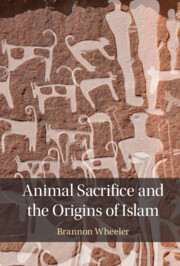Book contents
- Animal Sacrifice and the Origins of Islam
- Animal Sacrifice and the Origins of Islam
- Copyright page
- Contents
- Preface
- Introduction
- 1 Animal Sacrifices in the Life of the Prophet Muhammad
- 2 Burials of Camels at the Tombs of Warriors
- 3 Pagan Origins of Muslim Ḥajj Sacrifice
- 4 Abraham as the Originator of the Ḥajj Sacrifice
- 5 Distribution of the Body of the Prophet Muhammad
- 6 Martyred Bodies and the Demarcation of Territory
- Conclusions
- Bibliography
- Index
Conclusions
Sacrifice and Nostalgia for the Origins of Religion
Published online by Cambridge University Press: 09 June 2022
- Animal Sacrifice and the Origins of Islam
- Animal Sacrifice and the Origins of Islam
- Copyright page
- Contents
- Preface
- Introduction
- 1 Animal Sacrifices in the Life of the Prophet Muhammad
- 2 Burials of Camels at the Tombs of Warriors
- 3 Pagan Origins of Muslim Ḥajj Sacrifice
- 4 Abraham as the Originator of the Ḥajj Sacrifice
- 5 Distribution of the Body of the Prophet Muhammad
- 6 Martyred Bodies and the Demarcation of Territory
- Conclusions
- Bibliography
- Index
Summary
Why does “sacrifice” stand at the origins of religion? Both Muslim scholarship and nineteenth- and early twentieth-century Christian European scholars of religion believed that the violent ritual of dismembering an animal could be used to represent the true significance and purpose of religion. The modern study of religion is based on the camel “sacrifice” described by St. Nilus. Muslim scholarship utilized the example of the prophet Muhammad. In both of these sacrifices Arabs slaughtered and ate camels captured in combat, the camels substituted for a person, and the acts both signified and produced a communal solidarity among its participants, a social bond that could be maintained and replicated by the ritual performance of the original act. It also might not be merely serendipitous that both so closely resembled the Eucharist and that Christ’s distribution of his body and blood for his disciples to form the Church as the “body of Christ” looks a lot like other ancient Near Eastern and Indo-European myths of creation in which the body of a primal being is dismembered to form the world.
- Type
- Chapter
- Information
- Animal Sacrifice and the Origins of Islam , pp. 330 - 358Publisher: Cambridge University PressPrint publication year: 2022



